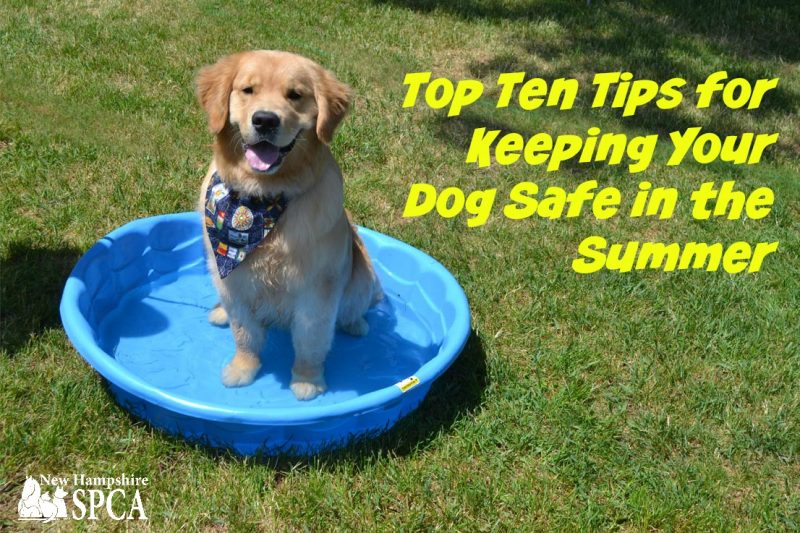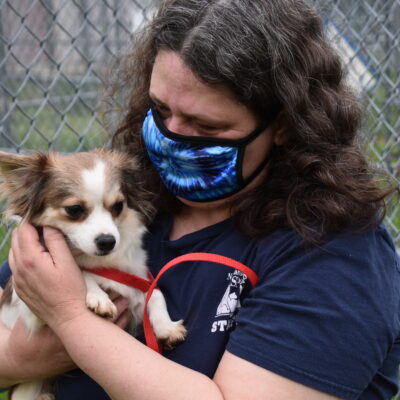
The warmer weather can be a wonderful time to spend with your dog, whether it’s exploring the great outdoors, taking a swim, heading off on vacation, or just relaxing in the shade; the possibilities for a fun time are endless! However, it can also be the potential for hazards for your dog’s safety and mental well being. Prepare yourself and your pet by keeping these seasonal tips in mind and help you and your dog spend those “endless days of summer” with peaceful mind and wagging tail!
1)Never Leave your Dog in a Parked Car!
If you need to head out and about, think about the safety of your dog first and please leave them at home. Even if your dog loves to go for rides with you, leaving him in the care for even a few moments can be deadly. Even on a 78 degree day the temperature of a parked car in the shade is 90 degrees. In just a few minutes, the inside of that same car can reach as high as 160 degrees, a life threatening temperature for your pet! Even with the windows rolled down a few inches ‘for airflow’ it is still a seriously dangerous and extremely HOT situation. Leaving your pet in the car can cause heat exhaustion, heat stroke, brain damage and even death. Check out our post Summer Safety- How Hot is your Car? for a handy temperature guide.
2)Dog Bites and Dog Fights
In the warm weather the number of dog bites and dog fights increase due to the increase in outdoor activities. So please keep this in mind if you are traveling to a location that may have other dogs. Be safe, never approach a dog you don’t know without asking the owner first, and if there is no owner to be seen, avoid any contact with the dog.
Dog parks can be tricky! They can be great fun, or possibly a very negative experiences for both you and your dog. Keep in mind that a dog park that you may frequent in the cooler months, may be much busier during the warmer weather. Again, more dogs and more people in a small area can be a recipe for a bite or fight. Even though you have control of your dog, realize that many people bring untrained and under socialized dogs to dog parks, creating a possible hazard for your dog. Having a negative interaction with another dog at a dog park, can easily lead to noticeable and potentially aggressive behavior changes in your dog. Play it safe, check out the dogs at the park before letting your dog go play. If there are unfamiliar dogs, or those that appear to be playing too rough or aggressively for your dog, it may not be a good time to play. Always think about whether or not you are setting your dog up for success and a positive experience. More Dog Park tips
3)Exercise in the Heat
All dogs need exercise, it is crucial for their mental and physical well-being. A tired dog is a happy dog, is a well behaved dog! However, special caution needs to be used in the summer sun. Special care needs to be taken for older dogs, short nosed dogs, and dogs with thick coats. We recommend that you exercise your pet in the early morning or late evening during the warmer months, avoiding the heat of the day. Remember that asphalt can get VERY hot and can burn dogs’ paws, so avoid pavement if possible, or keep moving and be sure to not linger on one spot too long! Sunburns are also a reality for dogs, especially for those with white fur or pink skin. The nose and tips of ears are highly prone to sunburn in most dogs, so you may need to apply sunblock before your dog out in the sun, just as you would for yourself.
4)How to Recognize Heat Stress
Heat Stress is a serious medical condition that can result in even more serious issues like heat stroke, brain damage, or even death. It is important for you to be able to recognize signs that your dog may be succumbing to heat stress. Remember dogs can NOT perspire like we do. They can only cool themselves by panting and they are much more susceptible to over-heating than people. Signs of heat stress include: heavy panting, glazed eyes, rapid pulse, unsteadiness, staggering gait, vomiting, or a deep red/purple tongue. To combat heat stress, apply cool (not cold), water gradually to your dog helping to decrease their temperature. Make sure to move them into a cooler, shady location. Dogs cool naturally from the bottom up, so helping to cool their top half is essential. Use cold ice packs, applying them to the head, neck and chest only will help. Offer your dog small amounts of water. Most importantly get them to a veterinarian immediately! Heat stress can be an emergency!
5)Thunderstorms and Fireworks
As many pet lovers know, fireworks and thunder storms can cause a great deal of stress for some animals. Fear of loud sounds – fireworks, thunder, gunshots – are called noise phobias. For a pet affected by loud noises, this is a terrifying and uncomfortable time; both for the pet and the people. Your pet cannot control their reaction to loud noises. Many therapies exist to help with this condition. Learn to recognize the signs of noise phobias and learn some tools for reducing fears. The NHSPCA Behavior and Training Department can supply you with the behavior tools you will need to help your dog work through their fear of loud noises. As always, talk to your vet if this is a problem for your pet. Behavior modification alone works well for some pets, others may need medications in addition to behavior modification to be safe and not injure themselves trying to “escape” the noise. Desensitization to loud noises is a slow and methodical process that is best done under the supervision of a professional.
Some commonly seen signs of noise phobias include:
Shaking, trembling
Excessive drooling
Barking, howling
Trying to hide or get into / out of the house, fence, or other enclosure
Refusing to eat food
Some animals may lose bladder or bowel control or experience temporary diarrhea from prolonged stress
Trying to escape from the loud noises can mean broken windows, torn fences, chewed doors or dog crates, and result in lacerations, foot pad injuries, teeth and mouth injuries or worse as they try to run from the disturbingly loud noises. Talk to the NHSPCA Behavior and Training Department to get more tips on how you can keep your pet safe during some of the loudest months of the year.
6)Keep Away from Crowded Events
We recommend that if you will be partaking in local festivities such as concerts, benefits, festivals, etc; that you leave your canine companion at home. Loud noises, crowds, coupled with heat can be extremely stressful for your dog. As a great pet parent, we know you want all of your dog’s life experiences to be good ones!
7)Beach Tips
If you are planning on bringing your pup to the beach, check local beach ordinances first as many beaches will prohibit dogs during summer hours. If you’ve found a beach that will happily host your furry friend, make sure to find a shady spot for him/her with plenty of fresh water. Drinking the sea water will make your dog sick. Keep in mind the sun exposure and use sun block on your dog if needed. Also, running in sand is extremely strenuous exercise and if your dog is out of shape he can easily pull a tendon or ligament. And finally, if your dog likes to venture into the ocean, make sure you wash them off when you get home as the salt and minerals from the sea can damage a dogs lovely coat.
8)Going for a Swim?
Most dogs enjoy swimming, but some cannot swim, and others may hate the water. Be conscious of your dog’s preferences and skills before trying to make him swim. If you’re swimming for the first time with your dog, start in shallow water and coax him in by calling his name. Encourage him with toys or treats. Or, let him follow another experienced dog he is friendly with. Never throw your dog into the water. If your dog begins to paddle with his front legs, lift his hind legs and help him float. He should quickly catch on and keep his back end up. Don’t let your dog overdo it; swimming is very hard work and he may tire quickly. If swimming at the ocean, be careful of strong tides. If you have your own pool, make sure your dog knows where the stairs or ladder is located. Be sure that pool covers are firmly in place; dogs have been known to slip in under openings in the covers and drown. Never leave your dog unattended in water. More water safety tips here.
9)Doggie Haircuts
Giving your dog a lightweight summer cut can help prevent overheating. Make sure to shave to a 1” length of hair. Never shave to the skin, as the skin needs to be protected from the sun. If you are not comfortable shaving your own pet, check out a local groomer to help you along!
10)Party Animals!
The warm weather is a time for family gatherings and parties galore! Keep in mind that your pet may not feel the same way about these rambunctious social gatherings as you, and may prefer to be kept in doors, away from the festivities. Again, loud noises, lots of strangers, and a break in their normal routine may be stressful for your dog. If your dog is a “party animal” and enjoys these exciting times, make sure they are supervised throughout their visits with guests, kids, and other animals; especially when food is present. Many human foods that we serve during our parties can be harmful or toxic to our furry friends. Avoid table scraps as a sudden change in diet can lead to stomach upset and other GI problems. Foods to steer clear of are raisins, grapes, onions, chocolate, and any products containing artificial sweeteners such as Xylitol as they are toxic to dogs.
Most importantly, enjoy your summer with your canine friends. Live, laugh….and learn, as the greatest training happens during our real lives!

